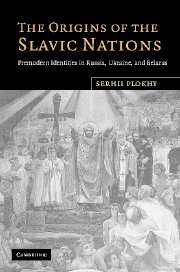Book contents
- Frontmatter
- Contents
- Preface
- Note on transliteration, dates, and translations
- Maps
- Introduction
- 1 The origins of Rus′
- 2 What happened to the Rus′ Land?
- 3 The Lithuanian solution
- 4 The rise of Muscovy
- 5 The making of the Ruthenian nation
- 6 Was there a reunification?
- 7 The invention of Russia
- 8 Ruthenia, Little Russia, Ukraine
- Conclusions
- Author index
- General index
4 - The rise of Muscovy
Published online by Cambridge University Press: 25 July 2009
- Frontmatter
- Contents
- Preface
- Note on transliteration, dates, and translations
- Maps
- Introduction
- 1 The origins of Rus′
- 2 What happened to the Rus′ Land?
- 3 The Lithuanian solution
- 4 The rise of Muscovy
- 5 The making of the Ruthenian nation
- 6 Was there a reunification?
- 7 The invention of Russia
- 8 Ruthenia, Little Russia, Ukraine
- Conclusions
- Author index
- General index
Summary
The title that I have chosen for this chapter is reminiscent of the one often used in textbooks on Russian history to denote the emergence of the Moscow principality as the leading force in Northeastern Rus′ – the rise of Moscow. Here I apply this cliché in a broader sense, covering not only the rise to prominence of the Principality of Moscow and its rulers but also the creation under their leadership of a unified state known in Western ethnography of the fifteenth and sixteenth centuries and present-day Western scholarship as Muscovy.
What was the ethnonational identity of early modern Muscovite Rus′? Was it as fragmented and local in nature as the identity of Lithuanian Rus′? Edward L. Keenan's interpretation of Muscovite history suggests that ethnic identity as it existed among the secular Muscovite elites was much less important than clan loyalty, and that those elites had much more in common with Turkic and Lithuanian elites than with the Muscovite peasantry. Nancy Shields Kollmann has reached similar conclusions in her study of social identities in early modern Russia: “The boundaries of identity in pre-modern times were not fixed but fluid, the content of identity was not national but local and personal. And this was the case regardless of how strong a learned discourse a given social body might have possessed about community and society.”
- Type
- Chapter
- Information
- The Origins of the Slavic NationsPremodern Identities in Russia, Ukraine, and Belarus, pp. 122 - 160Publisher: Cambridge University PressPrint publication year: 2006



